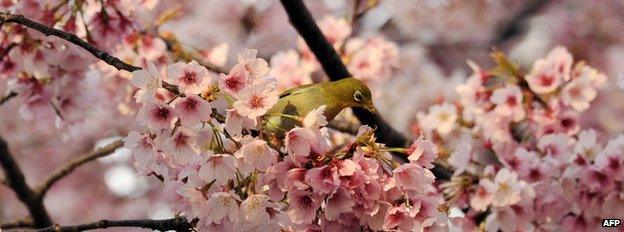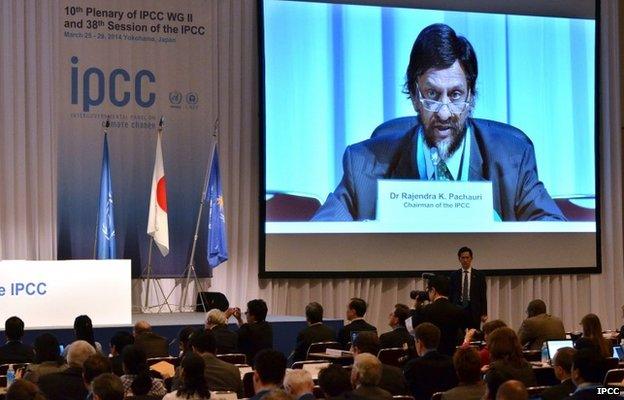Climate report aims to blossom in Japan
- Published
- comments

It's springtime in Japan and the blossoms are spectacular as usual
Haiku, high towers and the scent of cherry blossom all come into play as government officials and scientists discuss the global impacts of climate change.
"There are no strangers under the cherry blossoms," said Mr Nobuteru Ishihara, Japan's minister for the environment, as he welcomed members of the Intergovernmental Panel on Climate Change to what's likely to be a fractious session here in Yokohama.
The scientists and government officials will spend the next four days trying to clarify and summarise how climate change will impact the world over the next 100 years.
No easy task, and already there are some dissenting voices over the tone and content of the draft report.
But with the cherry trees in this huge city just about to bud, Mr Ishihara, was hoping to encourage a collective spirit in the work, by quoting from a celebrated haiku written by the Japanese poet and Buddhist preacher, Kobayashi Issa.
However, given that his audience is likely to spend the next few days, and possibly nights as well, working through every comma of a complicated text, the minister could also have cashed in on some Issa alternatives.
"All the time I pray to Buddha, I keep on killing mosquitoes."
Or, my personal favourite: "Hey sparrows, no urinating on my old winter quilt."
I can see that one coming in handy over the next week!
Classical allusions were all the rage in the opening ceremony, with the co-chair of the working group tasked with producing this new report describing the five-year effort to get it together as an "odyssey".
'Gloves are off'
Dr Chris Field highlighted the fact that the scale of this report was far broader than in the past. Over 300 authors worked on it, he said. There have been 50,000 review comments to process.
It had been a remarkable journey to produce a report that was "scientifically bold", he added.
Dr Field also gave an interesting new definition of what the IPCC is all about. He said there were plenty of organisations out there whose job was to share information about climate change.
"I think of them mainly as bells," he said, taking a leaf from earlier monastic references. "Their goal is to ring a message as loudly and clearly as possible.
"The IPCC is fundamentally different. It is more like a bell tower than a bell. Its role is to not so much ring the message of climate change as it is to elevate the community, giving everyone a chance to see farther and more clearly from a great height."
So when will the bells end?
I think it's likely that regardless of his intentions, the publication of this report next week will hear them tolling far and wide.
Listening carefully to all this talk of haiku and high towers was long-time IPCC chair Dr Rajendra Pachauri.
In his remarks, Dr Pachauri went out of his way to praise Japan's contribution, stating that he himself had visited the country on professional business 150 times. All these trips have made him something of a media star here and he's rapidly been booked up with interviews.
Journalists were let into the proceedings for an hour to hear these speeches, all the while closely watched by burly security staff, wearing immaculate uniforms.
But after the sweet-talking, we were asked to leave the room. The pleasantries were over. Unlike the security guards, the negotiators' kid gloves will definitely be coming off over the next few days.

Down to the nitty-gritty: Dr Rajendra Pachauri is in demand here